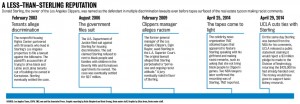There was at least one face missing in the crowd as the Los Angeles Clippers blew out the second-seeded Oklahoma City Thunder on Monday. That face was Clippers owner Donald Sterling.
Sterling missed the game because last week, the NBA joined a host of organizations cutting ties with Sterling by banning him for life from professional basketball. This decision came following the release of an audio tape in which Sterling explained to his girlfriend why she shouldn’t be seen at Clippers games with black people after she posted an Instagram picture with Magic Johnson.
UCLA also chose to distance itself from Sterling. Last week, the university rejected a $3 million donation to the Division of Nephrology from the billionaire real estate tycoon after accepting an initial $425,000 installment of the gift before the audio tape was released.
But why are organizations just now cutting ties with Sterling? As recently as 2009, Sterling settled for about $2.7 million in a lawsuit accusing him of discriminating against black and Latino and Latina tenants when renting out his properties around Los Angeles County. And that was simply the latest in a string of lawsuits filed against Sterling for prejudiced renting practices.
With Sterling’s history of troubling behavior, it seems strangely inconsistent for UCLA to initially accept $425,000 from Sterling, but then later reject the gift because, according to a university statement, he doesn’t share the university’s values of “diversity, inclusion and respect.”
Ultimately, what it comes down to is a matter of consistency for UCLA in deciding whether or not to accept a donation.
If it’s the case that donors must share the university’s values, then that stance should be applied from the outset, not after the fact. Sterling’s history should have raised red flags from the beginning.
I don’t blame you if your first response is to pat the university on the back for having a moral compass. But think about this: The university only backed out of the deal after Sterling was publicly and professionally condemned.
The fact is the university cannot feign ignorance of Sterling’s past. His entire career as an owner has been marred by these types of allegations. In fact, former longtime Clippers general manager Elgin Baylor said in a lawsuit that Sterling envisioned a Southern plantation-type structure for the Clippers where “poor black players played for a white coach.”
When asked if the university considered Sterling’s history, UCLA spokesman Steve Ritea referred me back to the university’s statement rejecting the gift (there was no mention of Sterling’s past indiscretions in the statement).
In an email, Ritea also said that “every significant donation is carefully and thoroughly reviewed by our development staff and its leadership.” He added that any donation over $1 million is reviewed by UCLA Chancellor Gene Block, who also made the decision to return Sterling’s gift.
Let’s bring all the pieces together: After going through the university’s rigorous donation review, which either didn’t find or didn’t care about Sterling’s past, Block agreed to accept the initial $425,000 and another $2.575 million over the next seven years.
Then, after Sterling was caught saying explicitly racist things in private to his girlfriend, all of a sudden the university felt he didn’t share its values.
If it is the case that the university “carefully and thoroughly” reviews each donation, then it must have known who it was doing business with from the beginning. Now, it just seems like the university has made a $3 million public relations move to cover its tracks.
What the whole Sterling situation demonstrates is the need for a more concrete stance on whom the university is willing to accept gifts from. If the university is really trying to stay on a moral high ground in its donation review process, then it should do that by sticking to whatever “core values” it thought Sterling violated from the beginning.
This can be done simply by being more clear and consistent about what the university expects from donors. If the university decides that we should take the money because it will use it to do some good – even if it’s from dirty hands – then the university should stick to that. Or if the university cares about donors acting according to its values, then those values should be specific, and it shouldn’t take the threat of bad publicity to make them important.
We like to think of universities as places that foster values we should try to embody – diversity, inclusion and respect, for example. But, we also tend to forget that universities, along with being academic institutions, are businesses as well.
UCLA has to pick which set of principles should come first – the bottom line or the core values it claims Sterling violated.
Email Fife at tfife@media.ucla,edu or tweet him @fifetravis94. Send general comments to opinion@media.ucla.edu or tweet us at @DBOpinion.

